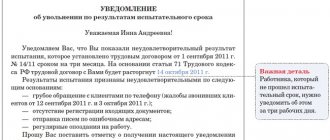Labor relations are regulated by special legal norms, which must be observed by both the employer and the employee. The main body of laws is the Labor Code, but besides it, there are many legislative acts and regulations that protect the rights and interests of participants in labor relations.
At the beginning of cooperation, the employer and employee sign an employment contract establishing the obligations and rights of the parties, principles of remuneration, and other aspects. Labor laws also determine issues of dismissal.
An employee can quit for various reasons - at will, by agreement of the parties, due to layoffs. At your own discretion, you can write a letter of resignation if a more profitable employment option becomes available or if certain family circumstances arise. Dismissal occurs with or without work, depending on the terms of the employment contract and the rules of the enterprise.
A citizen has the right to write a letter of resignation when he needs it, and the manager must sign it (if necessary, with mandatory work). But sometimes employers do not sign the resignation letter, what to do in this case? After all, a person’s plans can be seriously disrupted.
What measures can be taken to protect your rights when the employer does not sign the letter of resignation? It is worth studying the legislation in this matter or you can seek help from an experienced lawyer, he will help evaluate the actions of the boss and tell you how to sign a statement according to the law.
Dismissal rules
Any employee can change his place of employment without good reason. Basic information about the rules for terminating cooperation is provided in Chapter 13 of the Labor Code. In Art. 80 of the Labor Code provides information on the rules for terminating an employment agreement by filing an application at will.
The dismissal procedure is divided into successive stages:
- drawing up an application for dismissal according to a special sample, by hand or on a computer;
- submitting an appeal to the director of the company;
- work within two weeks;
- the head of the company cannot refuse to sign this documentation;
- the citizen receives a salary, compensation and personal documents.
With this sequence of actions, the employment relationship with a specific employer is terminated.
https://youtu.be/zl4NDLk-atQ
General rules for voluntary dismissal
According to Article 80 of the Labor Code of the Russian Federation, an employee has the right to apply for termination of an employment contract at any time. In a standard situation, a citizen writes an application and submits it to the personnel department. The personnel officer is obliged to accept the document and begin processing the necessary documents.
The employee needs to work for two weeks. On the last working day, the director signs the dismissal order. The citizen gets acquainted with him under his signature. They give him a work book and pay him in full.
Application rules
An employee who wishes to stop working at his own request must correctly draw up a statement. For this, the following rules are taken into account:
- compiled by hand or on a computer;
- the purpose of drawing up the appeal, represented by the termination of the employment agreement, is indicated;
- the date and place of compilation are given;
- the document is handed over personally to the director or sent by mail to a representative of the enterprise’s personnel service.
Based on such a document, the director issues an official order to terminate the employment contract.
Is it legal to refuse to dismiss an employee?
If the boss does not sign the resignation letter, then this is a violation of the Labor Code. It does not matter for what reasons the specialist wishes to terminate cooperation.
Obstacles are only possible if a citizen has caused damage to the organization’s property and therefore wants to resign without compensation. But it is prohibited to force a citizen to work, so all conflict situations are resolved only legally, for which you have to go to court or other government agencies.
The employer does not sign the resignation letter of an employee who is on vacation
If an employee is on vacation, his dismissal is no different from the termination of the relationship between the employee and the manager:
- the specialist writes a letter of resignation and submits it to the manager;
- the employer reviews the document and decides whether to sign it or not;
- After drawing up the order, the relationship is considered terminated.
The main difference between the dismissal of an ordinary employee and an employee on vacation is that he does not need to work a two-week period if the period coincides with the vacation time. For example, if the vacation lasts from March 1 to March 28, and the application is written on March 10, then there is no need to work it out. But if the document was drawn up on March 20, you will have to work for 6 days.
Please note that the application does not have to be submitted in person. It can be sent by registered mail. And receive the payment on the card, documents - by courier.
Watch the video. Form and registration of resignation letter at own request:
https://youtu.be/SYvmVaSksk8
Why does the employer refuse to sign?
It is recommended to draw up two documents at once, since one copy is handed over to management, and the second copy is marked with acceptance. If the employer does not sign the resignation letter, this is usually due to the following reasons:
- the specialist plans to move to a competitor;
- there is no opportunity to find a replacement;
- the employee is represented by a specialist, so the manager wants to continue cooperation with the professional;
- the employee has not completed many tasks specified in the employment agreement or instructions;
- The management has a personal interest in detaining the citizen.
Regardless of the reason, the employer does not have the right to refuse to dismiss a person.
How to write a resignation letter correctly
There is no ideal sample on the basis of which an application for voluntary resignation from work is created.
Remember! Here is a list of certain criteria, taking into account which the application should be drawn up:
- documentation must be in the form of a written form, copied or compiled by hand;
- the employee must indicate his goal regarding termination of the employment contract;
- the date of drawing up the application and the personal signature of the applicant must be indicated;
- You can submit the form either during a personal visit or by sending it by mail;
The application is submitted:
- directly to the employer;
- to the higher management of the labor organization (exclusively by mail);
- to the personnel department;
- directly to the head or director of the relevant structure;
- to the office or secretary of the general director.
Upon consideration of the application, the company’s management will draw up an act, the content of which is determined by the current Russian legislation.
The document contains:
- name of the form;
- personal and official data of the individual in whose name the application is submitted, as well as contact information about the applicant employee;
- the contents of the document must disclose the employee’s motives for terminating the employment contract with reference to the relevant paragraphs of the Labor Code of the Russian Federation;
- at the end, the date by which the employee will no longer be included in the ranks of the organization’s workforce is indicated;
- date of application and personal signature of the resigning person.
ATTENTION! Look at the completed sample application for dismissal without service:
What to do if you refuse?
Although company managers are usually well versed in labor regulations, sometimes they deliberately violate legal requirements. Therefore, citizens have a question about what to do if they do not sign a letter of resignation. If a person wants to leave the company, then he performs the following actions:
- a resignation letter is drawn up, but since the director does not want to accept the document, the paper is handed over to a representative of the personnel service;
- work is carried out within two weeks;
- a specialist comes to the personnel service to obtain a work book and an order from the manager, and he is paid not only a salary, but also compensation for unused vacation.
If the company does not have a personnel department, and the manager refuses to sign the appeal, then the document is sent to the company’s address by letter with acknowledgment of delivery. After working off, work stops, so you just need to wait for the official order and payment.
Attention! The application is sent only with payment of delivery notice.
Submitting a resignation letter without visiting your manager
Let's move on to the details. The procedure for dismissing an employee on his own initiative is considered from two points of view - dismissal in the usual manner or during a probationary period. The second case has its own subtleties in terms of deadlines. The first case is described in the already mentioned Article 80 of the Labor Code of the Russian Federation and obliges the employer to fire you and end all relationships, including settlement ones, within no more than 14 days. What does this mean?
You submit an application, after which, regardless of whether the manager’s signature is on it, you can wait two weeks so that you don’t have to go to work and demand payment and the return of your work book. In practice, you should take steps to ensure that the employer does not abuse the right, in particular:
- write the application in two copies, bring it to the personnel department and make sure that the incoming number and date are indicated on it, in addition, make sure that the number and contents of the document are entered in a journal with “continuous” numbering;
- do this even if your boss signed your application during a personal meeting - if the document is not registered, the employer may claim that you did not warn him within the prescribed time frame;
- if your application is refused, send it by mail, but only by registered mail and only with acknowledgment of receipt - 14 days must pass from the moment of delivery to settlement, no matter what the HR department tells you, moreover, make a list of the attachment so that your application not replaced with a blank slate;
- the manager is obliged to sign the application after the deadline, regardless of whether he wants it or not.
Several more pitfalls can be avoided if you know the intricacies of the rules for disciplining an employee. For example, they threatened to “fire you with a bad article.” There must be grounds for this, but even if you had violations for which penalties were issued, this is not a basis for dismissal under the article - you cannot be punished twice.
You need to find a new violation, formalize it with an order, familiarize you with it, and only then make a decision on dismissal, and even then in case of “systematic violations” of labor regulations, discipline, or failure to fulfill duties. Please note that the previous penalty “works” only for three months, then new reasons are needed.
Contacting the labor inspectorate
Anyone can resign at their own request, but if the employer creates an obstacle, then you have to turn to government officials for help. To do this, it is advisable to file a complaint with the labor inspectorate. The rules of the process include:
- a free form of address is used;
- information about the applicant and the company in which he works is indicated;
- the essence of the complaint is given, which is that the employer does not want to fire the specialist, therefore does not sign his resignation letter;
- other documents are attached to the application to prove that the applicant is right.
You can submit a complaint during a personal visit to the office or via mail, or you can also submit an electronic appeal on the institution’s website. The application must be submitted within three months after the offense was committed by the employer. If a citizen does not meet this deadline, he will have to go to court.
If inspection representatives identify a violation, they force the employer to eliminate it, which requires signing a statement. The director does not have the right to bring a specialist to disciplinary liability for absenteeism. Additionally, the head of the company is subject to disciplinary and administrative liability.
We remind you that even if you thoroughly study all the data that is in the public domain, this will not replace the experience of professional lawyers! To get a detailed free consultation and resolve your issue as reliably as possible, you can contact specialists through the online form .
What to do if the boss prevents the termination of the employment contract at the initiative of the employee?
The employer does not have the right to prevent the dismissal of an employee at his own request, even under the following pretexts:
- conducting an inspection;
- transfer of cases (supposedly the whole procedure will take more than two weeks);
- debt service, etc.
Expert opinion
Lebedev Sergey Fedorovich
Practitioner lawyer with 7 years of experience. Specialization: civil law. Extensive experience in defense in court.
In accordance with Art. 37 of the Constitution of the Russian Federation and Art. 4 of the Labor Code of the Russian Federation, forced labor in any of its manifestations is prohibited. By this, labor legislation understands work under threat of punishment.
Responsibilities for military or alternative civil service, work under emergency circumstances or in wartime are not considered forced labor and are regulated by special norms.
Many managers are confident that they have the right to refuse dismissal if:
- the employee was trained in a targeted area, and the employment contract specifies the minimum period of work in a certain organization (for example, 2 years or 5 years);
- the employer entered into an apprenticeship agreement with the employee (Article 198 of the Labor Code of the Russian Federation).
The legislator did not provide an exact list of valid reasons. The courts are guided by the Resolution of 07/09/1980 of the State Committee for Labor of the USSR No. 198 and the Secretariat of the All-Union Central Council of Trade Unions No. 12-21, which has actually lost force, and part 3 of Art. 80 of the Labor Code of the Russian Federation (grounds for dismissal without two-week work):
- health conditions that do not allow you to continue working in such a position;
- conscription into the army;
- retirement (if the employee has not previously been dismissed on this basis);
- the need to care for a disabled relative;
- transfer of a spouse to work in another area;
- other reasons that may be considered valid.
This is important to know: Order on transfer of cases upon dismissal: sample 2020
In what forms can this manifest itself?
Obstruction of dismissal can manifest itself in a variety of forms.
- Persuasion to quit later.
At first glance, this form seems harmless. The employer will say: “wait a little, we’ll find someone to replace you, then write an application.” But the waiting period may drag on, and a job with more attractive conditions that the employee would like to switch to may go to someone else during this time.
- The employer refers to a local act that prohibits quitting during certain periods.
The internal documents of the organization cannot establish periods during which an employee is obliged to work. However, similar requirements can be reflected:
- in labor legislation (emergency situations, etc.)
- in certain legislative acts (for example, Federal Law No. 342 “On service in internal affairs bodies”, according to which a police officer cannot resign at will during an armed conflict, emergency situations, etc.).
The above acts do not directly prohibit dismissal. If the same police officer does not want to participate in the counter-terrorism operation and wants to leave the service at that time, he will be released. But only on the basis of refusal to serve under special conditions, and not of one’s own free will.
- Prohibition of employment in a competitor's organization.
Formally, the employer does not prohibit resigning, but does not allow you to get a job with a competitor after leaving (for example, the seller of Magnit PJSC will be prohibited from getting a job at Dixie Group JSC), citing the terms of the employment contract. Such demands are contrary to the law.
At the same time, the Letter talks about the protection of trade secrets (Federal Law No. 98 dated July 29, 2004).
Important! An employer can hold a former employee financially liable for disclosing a trade secret if he had access to it under the employment contract and additional agreement, and if it is discovered that it was the employee who disclosed it.
- Employer threats.
The employer can threaten dismissal for guilty actions (“under the article”), by hanging a shortage or framing it in some other way. The employee is required to record such threats and, if possible, attract witnesses to prove a violation of his labor rights.
- Refusal to sign or register an application.
Often, the employer refuses to accept the resignation letter without explanation or does not sign it (simply ignores it) - we’ll figure out what to do with this below. If the employer has prohibited those responsible for personnel work from dismissing an employee, then this will also be a violation of labor laws.
Filing a claim in court
If you cannot resolve the conflict peacefully, you will have to defend your rights in court. To draw up a claim, the provisions of Art. 131-132 Civil Procedure Code. Documents confirming that the citizen cannot resign are attached to the claim.
The documentation is submitted to the district court or magistrate, and the court is selected at the location of the defendant company. The district court considers cases in which the amount of the claim exceeds 50 thousand rubles. The judge will force the employer to sign a statement and pay a penalty, and sometimes moral compensation is awarded.











